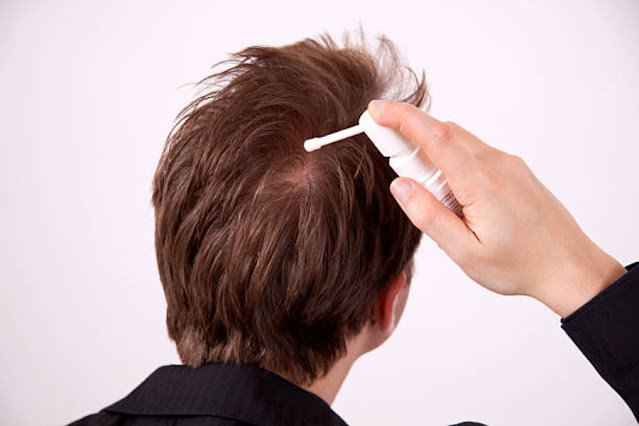Hair Loss Sprays

Hair Loss Sprays: An Overview of Products, Usage, and Effectiveness
Introduction
Hair loss is a common concern for many individuals, and hair loss sprays have emerged as a popular option for addressing this issue. These
sprays offer a convenient and targeted approach to combat hair loss by
delivering active ingredients directly to the scalp. In this guide, we will
explore the world of hair loss sprays, examining their elements, application
methods, potential benefits, and factors to consider when selecting a product.
By the end, you will have a comprehensive understanding of hair loss sprays and
be better equipped to incorporate them into your hair care routine.
I. Understanding Hair Loss
A. Types of Hair Loss
B. Causes and Contributing Factors
C. The Role of Genetics and Hormones
D. Lifestyle and Environmental Factors
II. Hair Loss Sprays: How Do They Work?
A. Mechanism of Action
B. Common Active Ingredients
Minoxidil
Finasteride
Natural Extracts and Nutrients
C. FDA Approval and Clinical Studies
III. Choosing the Right Hair Loss Spray
A. Identifying the Underlying Cause of Hair Loss
B. Understanding the Formulations
Minoxidil-Based Sprays
Finasteride-Based Sprays
Combination Formulations
Natural Extract-Based Sprays
C. Considering Personal Preferences and Needs
D. Seeking Professional Advice
IV. How to Use Hair Loss Sprays
A. Preparing the Scalp
B. Application Techniques
Proper Spray Distance and Direction
Scalp Massaging for Absorption
C. Frequency and Duration of Use
D. Potential Results and Timeframe
E. Managing Expectations
V. Potential Side Effects and Safety Considerations
A. Common Side Effects
B. Allergic Reactions and Sensitivities
C. Safety Precautions for Specific Ingredients
D. Interactions with Other Medications
E. Pregnancy and Breastfeeding Concerns
VI. Complementary Hair Care Practices
A. Adopting a Comprehensive Hair Care Routine
B. Nutrition and Dietary Considerations
C. Stress Management and Lifestyle Factors
D. Gentle Hair Handling and Styling Techniques
VII. Additional Hair Loss Treatments
A. Combination Therapies
B. Professional Treatments and Procedures
C. Hair Transplantation Options
D. Emerging Technologies and Therapies
VIII. Frequently Asked Questions
A. Are hair loss sprays effective?
B. How long does it take to see results?
C. Can hair loss sprays regrow hair?
D. Can hair loss sprays be used by both men and women?
E. Are hair loss sprays suitable for all types of hair loss?
Hair loss sprays can potentially help in regrowing hair, but it's essential to understand their limitations and manage expectations. The effectiveness of hair loss sprays in regrowing hair depends on various factors, including the underlying cause of hair loss, the specific spray formulation, and individual response.
Some hair loss sprays contain active ingredients, such as
minoxidil, clinically proven to stimulate hair regrowth in specific
individuals. Minoxidil is an FDA-approved ingredient commonly found in
over-the-counter hair loss sprays, and it works by increasing blood flow to the
hair follicles and extending the growth phase of the hair cycle. With
consistent and proper use, minoxidil-based sprays may help regrow hair in
individuals experiencing androgenetic alopecia (pattern hair loss) or mild to
moderate hair thinning.
It's important to note that hair regrowth results can vary
from person to person. While some individuals may experience noticeable
regrowth, others may see minimal or no improvement. Hair loss sprays are
generally more effective in the early stages of hair loss when the hair
follicles are still active. If the hair follicles have become dormant or the
hair loss is advanced, hair regrowth may be more challenging to achieve through
topical sprays alone.
Hair transplant procedures or other more intensive
treatments may be necessary for individuals with severe or advanced hair loss
to restore hair growth.
To determine the best approach for addressing hair loss and
regrowing hair, it is advisable to consult with a healthcare professional or
dermatologist who can evaluate your specific condition and recommend suitable
treatment options, which may include the use of hair loss sprays in conjunction
with other therapies or lifestyle modifications.
Conclusion
Hair loss sprays offer a targeted and convenient approach to combating hair loss. You can maximize the potential benefits by understanding the underlying causes of hair loss, choosing the right spray formulation, and following proper application techniques. It's essential to be aware of potential side effects and safety considerations and complement your hair care routine with other healthy practices. While hair loss sprays can be a valuable addition to your hair care arsenal, individual results may vary, and patience is critical. If you have concerns or questions, consulting with a healthcare professional or dermatologist can provide personalized guidance.